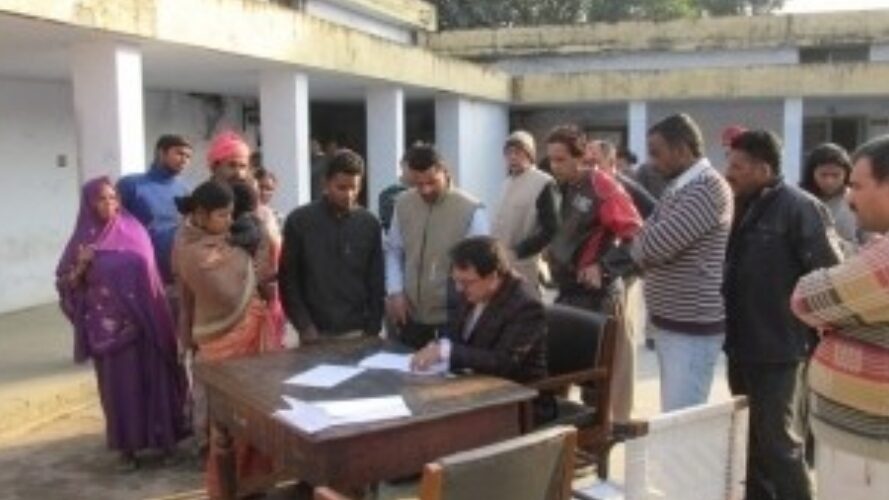IJM Delhi’s First Operation Brings Rescue Despite Angry Mob, Freezing Cold, More Challenges
Slavery
The rescue operation was the first of the year for IJM—and it was the first ever for IJM Delhi.
IJM Delhi is strategically located in the capitol city of India. The IJM team advocates with the central Indian government to strengthen anti-slavery legislation nationwide, and it trains and equips partner organizations throughout India to rescue and restore forced labor slaves. In this January operation, IJM worked with Volunteers for Social Justice, another NGO working in the northwestern state of Punjab.
A Harsh Reality
Most of the families in the brick factory had been working for three to six years. The manual labor was routine as it was ruthless. They worked up to 18 hours a day, often beginning the grueling cycle of molding clay into bricks at 2 a.m. They were monitored at all times and could not leave even for medical emergencies. The families said the owner did not provide enough money for basic meals; they had to go into debt with local grocery stores to buy rice.
For some of the children, this was the only life they had known. They were born into slavery.
"The babies were barely clothed and blue with cold," observed IJM's Anu George Canjanathoppil on the day the rescue team showed up at the brick factory. She added, "I saw blood from the nose caked above their lips. It reminded me again of how much they faced every day for the last few years."
Discovering Slavery
When IJM and VSJ presented the evidence of forced labor slavery at this brick factory, the district officials were in disbelief that slavery could exist in their state.
Although India has the largest number in any country in the world, this utter lack of awareness about the reality of modern day slavery is not unusual. VSJ has been working in the state of Punjab for nearly 30 years, and it was not until 2012 that the state acknowledged emancipated forced labor slaves by issuing official release certificates. IJM assisted VSJ with that operation.
After the NGO's laid out the facts about the conditions at the brick factory, the head district official ordered her subordinate to lead the rescue operation. Upon arrival, the rescue team gathered all of the families and helped them load into two trucks that would take them back to the government office for interviews. One woman was rushed to the hospital in an ambulance for a heart condition. She had not been able to get medicine she desperately needed for weeks.
The Battle for Freedom
Back at the government office, it was clear they had never conducted a rescue operation and were unfamiliar with the process to emancipate forced laborers. IJM explained the interview process and helped them organize the slaves into smaller family units to make documentation easier.
At one point, an angry mob organized by local grocery store owners showed up at the government offices, demanding money for the rice the slaves had borrowed on credit to avoid starvation. The group was volatile, as several other brick factory owners, trade union members, and local political figures clamored for attention. The store owners shouted and threatened the laborers, "Let me see how you can ever get out of Punjab!"
As the interview process ended and nighttime drew near, the officials announced that no one would be receiving a release certificate—the critical document that emancipates and serves as legal protection to its holder. Anu and the IJM team were perplexed; it was clear by the slaves' own admission that they had been held against their will and not allowed to look for work elsewhere. It was a clear-cut case of forced labor slavery.
Anu told the government officials, "We will sit with [the slaves] and their tiny babies, freezing in this roofless courtyard, until the release certificates are given."
Persistence Pays Off
Refusing to give up, the IJM and VSJ team came up with a new plan. It was now dark, and all of the slaves were still waiting in the open courtyard. Around midnight, after relentless advocacy from IJM and VSJ, the officials opened up another shelter across the street that was warmer and safer. The next morning, the battle for the slaves' freedom resumed.
The officials finally agreed to re-do the interview process and have the slaves' statements read aloud to them, so they could confirm that the information they spoke was actually recorded in writing. On Friday afternoon, January 3, a decision was made: 28 people, including seven children, would receive release certificates. Each one also received the initial installment of the government rehabilitation money given to former slaves.
After years in slavery, the families were going home. They boarded trains to take them nearly 1,000 miles across several state lines. Another IJM-trained partner based out of their home state will provide aftercare to the families and ensure they have the tools they need to rebuild lives in freedom.